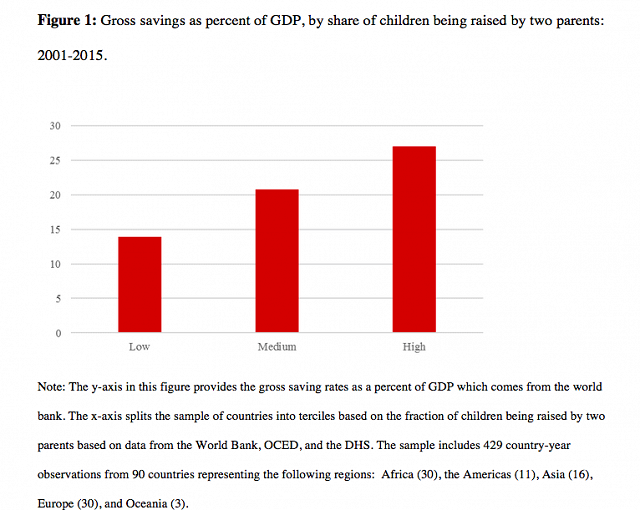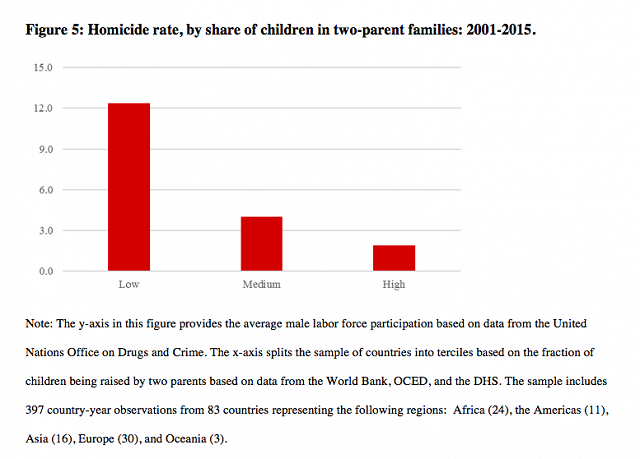Highlights
- W. Bradford Wilcox and Joseph Price show that more two-parent families foster more household savings, decrease crime, and improve children’s academic success in nations across the globe. Post This
- The savings rate is nearly double in countries with the most two-parent families, compared to the countries with the fewest two-parent families. Post This
- There is clearly a link between family structure and economic growth. Post This
Economics has its roots in the Greek word “oikonomia,” which means the “management of the household.” Yet economists across the ideological spectrum have largely neglected the links between household family structure and the macroeconomic welfare of nations. With economics professor Joseph Price, IFS senior fellow W. Bradford Wilcox sought to remedy this oversight by examining the association between family structure and global economic growth in a chapter in the new book, Unequal Family Lives.
According to Wilcox and Price:
A stable marriage matters in part because it allows couples to make decisions over time that maximize the economic prosperity of their family unit. Stably married persons have incentives to invest in their marriage and benefit from specialization and economies of scale; their households also tend to earn and save more than their peers who are unmarried or divorced.
They argue that because of the economic benefits of marriage, “the more children are born and raised in stable, two-parent families, the more a society should experience economic growth.” To test their theory, they utilized marriage statistics, historical data on children, and gross domestic product (GDP) data from over 90 countries between 1968 and 2014. In a fixed-effects regression analysis, they found a positive relationship between marriage and economic growth around the world. Specifically:
for every 13-percentage-point increase in the proportion of adults who are married, there was an 8 percent increase in per capita GDP, net of controls for a range of sociodemographic factors. Likewise, every 13 percentage point increase in the proportion of children living in two-parent families is associated with a 16 percent increase in per capita GDP, after controlling for education, urbanization, age, population size, and other factors.
They conclude, "There is clearly a link between family structure and economic growth.”
But why would married, two-parent families help to boost the wealth of nations? Wilcox and Price pinpoint three specific mechanisms that may explain the family-wealth connection, showing that more two-parent families 1) foster more household savings, 2) decrease crime, and, 3) improve children’s academic success across the globe.
Household Savings
Consider savings. Using data from the World Bank, the Organization for Economic Co-operation and Development (OECD), and the Demographic and Health Surveys (DHS) to examine the household savings rate in 90 countries, Wilcox and Price find that the proportion of children living in two-parent families is associated with higher savings rates in the countries examined. In fact, the savings rate is nearly double in countries with the most two-parent families, compared to the countries with the fewest two-parent families.

Public Safety
Because safer communities are more prosperous, Wilcox and Price also explored the connection between two-parent families and violent crime in countries around the globe. We know that marriage and stable families help to reduce crime in two primary ways: 1) by discouraging men’s involvement in criminal activities and 2) by reducing children’s risk of involvement in delinquency and crime as adolescents and young adults. They point to neighborhood-level data from the U.S. and Canada, which indicates an association between more married families in a community and less crime. But what about violent crime at the country level? Using data from the United Nations Office on Drugs and Crime (UNODC), they found a strong negative association between the proportion of children raised in two-parent families and homicide rates in 83 countries, including countries in Africa, North and South America, Europe, Asia, and Oceania.

As the figure above illustrates, the average homicide rate is more than four times larger in countries in the bottom third in terms of children living with two parents compared to countries in the top third.
Educational Achievement
Another way more marriage and two-parent families may lead to higher economic growth is by boosting human capital for children. As Wilcox and Price explain, “children may benefit from the higher levels of time, money, and stability found in two-parent families, compared to single-parent families,” resulting in better educational outcomes that improve their future career success. In the U.S., there is ample research linking children’s academic success to married families. For example, children in married-parent families are more likely to graduate from high school, earn a college degree, and get a good job as adults than children from single-parent families.
Similarly, in other developed nations, children raised in two-parent families are less likely to repeat a grade and more likely to perform well on standardized testing. Wilcox and Price point to Sweden, Singapore, and Indonesia, where children in single-parent homes are “at least 70 percent more likely to be held back in school compared to their peers from two-parent families.” Moreover, in Europe, children from single-parent families are more likely than those from two-parent families to skip school.
Overall, Wilcox and Price show that marriage and two-parent families may help to foster global economic growth by increasing household savings rates, decreasing crime, and boosting children’s educational attainment in developed nations. While they acknowledge that their “results cannot definitively prove that family structure has a causal impact on economic growth,” they note, "if nothing else, the patterns documented in this paper suggest that stronger families, higher household savings rates, less crime, and higher economic growth may cluster together in mutually reinforcing ways."
These findings demonstrate that we cannot fully understand the forces fueling the wealth of nations without also paying attention to the health of the families that call those nations home.
W. Bradford Wilcox is Professor of Sociology at the University of Virginia, a Senior Fellow of the Institute for Family Studies, and a Visiting Scholar at the American Enterprise Institute. Alysse ElHage is editor of the Institute for Family Studies blog.













